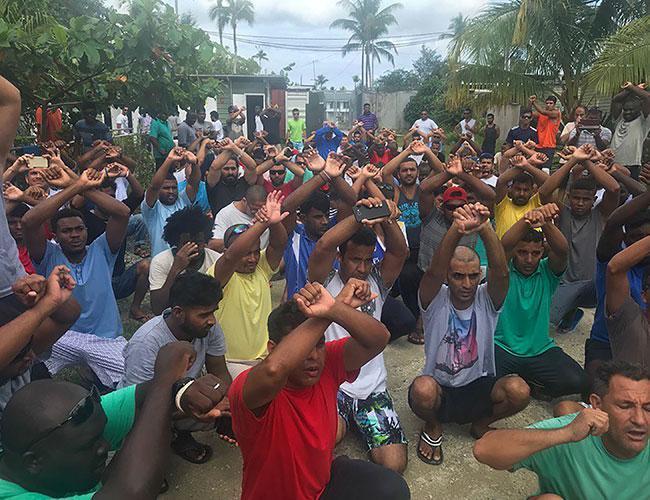
Refugees barricaded inside a shuttered Australian detention camp in Papua New Guinea were becoming "distraught and depressed", detainees said Nov. 3, as New Zealand renewed an offer to resettle some of them.
The remote camp on PNG’s Manus Island -- one of two centres holding asylum-seekers who tried to reach Australia by boat -- was proclaimed closed on Nov. 1 after the nation’s Supreme Court ruled it was unconstitutional.
Australia shut off water and electricity to the camp, but some 600 men remain inside, fearful for their safety if they move to transition centres where locals are reportedly hostile.
"The current mood of the men is they are really distraught and depressed," Manus detainee and Sudanese refugee Abdul Aziz Adam told AFP.
"We are just helping and caring for each other and trying to help each other just to stay alive," the 24-year-old said.
As the stand-off entered its fourth day, New Zealand’s new Labour government renewed an offer to take 150 of the refugees which was initially made in 2013 but never acted upon by Australia.
"We would like to work with Australia to help find a compassionate solution to this," Immigration Minister Iain Lees-Galloway told Radio New Zealand.
"We’ve got an offer of 150 people and we really hope that Australia takes that up... we are here to help," he said.
The issue is set to arise when New Zealand Prime Minister Jacinda Ardern, who came to power just last month, meets Australia’s conservative Prime Minister Malcolm Turnbull in Sydney on Sunday.
Iranian Behrouz Boochani, another Manus detainee, told AFP on Nov. 3 the detainees viewed New Zealand as a "big opportunity to take us from this hellhole prison".
"We are asking the New Zealand PM to make a serious negotiation with the Australian government and if Australia rejects it again, to try to do a deal with PNG."
Boochani added that the detainees were able to "collect water in rubbish bins" after a downpour the day before, and were also boiling water pooled inside a hole they had dug to drink.
"Many people are unable to sleep because of hunger and fear," he said.
The impasse has frustrated Manus Governor Charlie Benjamin, who accused the Australian and PNG governments of using his island as a "dumping ground" for the asylum-seekers.
"The ministers involved in signing the agreement to bring the asylum seekers to Manus in 2013 didn’t give a thought about the Manus people," he told PNG daily The National.
"They never did one time involve me in the negotiation although I was the governor at that time."
The UNHCR representative on the island, Lam Nai Jit, told AFP Thursday tensions were likely to rise as the men battled the "extremely hot and humid" weather.
A key concern for the refugees has been the lack of medication, particularly for those being treated for mental health conditions.
"Around 20 percent of people in the detention centre are being prescribed anti-depression drugs for obviously being depressed or for post-traumatic stress," Australian Greens senator Nick McKim, who visited the centre Tuesday, told AFP late Nov. 2.
The newspaper The Australian, which gained access to the compound on Nov. 2, said some of the men had not been outside the site since they were taken there years ago, and were almost hysterical about leaving.
Three transition centres on Manus were available for the men to move to, but the UNHCR said one was not finished while two did not have security fences.
Locals were also not consulted when the facilities were being built, stoking tensions between Manus communities and the refugees, Lam said.
Australia’s immigration department insisted Friday PNG had given the refugees "suitable alternatives" to move to, and that "any claims to the contrary are simply not true".
Canberra’s offshore processing policy has been criticised by rights groups as essentially placing refugees in indefinite detention on remote Pacific islands.
But the government says it has stopped deaths at sea after a spate of drownings.